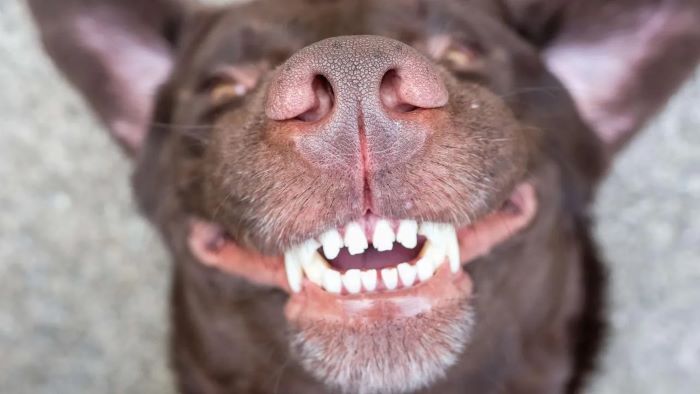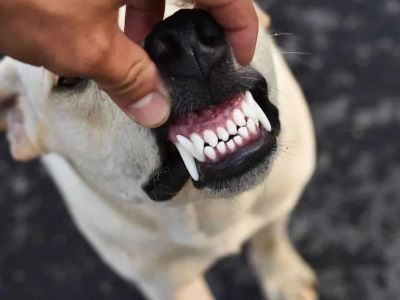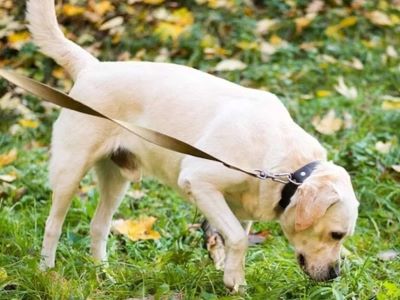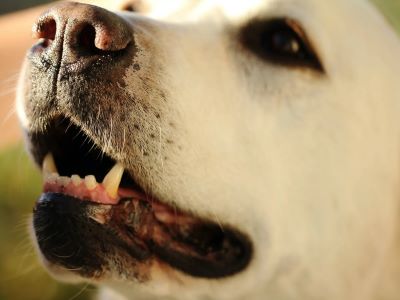Have you ever experienced a chattering of teeth? We humans normally chatter with our teeth when we feel cold and chill. Paw parents often witness the weird behaviours of their canine companions and have absolutely no idea about it. Although dog chattering their teeth is not a weird habit but may have serious reasons related to it.

When your dog chatters their teeth you may assume that it is due to cold and they might be feeling chill. But is it the right reason or is there so much more related to your dog chattering their teeth? This lack of knowledge can cause trouble for both you and your dog.
In this article, we will try to explore all the dimensions of why dogs chatter their teeth and what are the reasons behind this teeth chattering.
Causes of Teeth Chattering in Dog
Here are some cause of teeth chattering in dog, which will provide you clarity regarding your dog’s chattering habit:
Cold temperature
Usually, dog’s body temperature is higher than humans and they have fur to protect them from cold. Despite this dog too feels cold. One of the common and harmless reasons behind your dog chattering teeth can be due to cold.
When dogs feel cold they start to shiver as the muscles controlling the jaw shiver in response to the cold temperature. Due to this reason, dogs tend to chatter their teeth.
The reason behind the dog feeling cold can be extremely cold temperature or your dog may be wet. Often it is advised to dry dogs after bath, as they can catch cold due to wet bodies.
Your dog may even develop hypothermia, a condition which occurs when the dog’s body temperature drops. This can develop if your dog is left in cold temperatures for a longer period.
Generally, puppies and smaller dogs are more prone to catching colds, as their body cannot generate more heat as compared to adult dog

Fear and anxiety
Dogs may even chatter their teeth when they fear something or are having anxiety. There are many reasons behind your dog’s fearful behaviour and anxiety. Dogs tend to fear many things and their fear usually differs. Be it some kind of specific sound or thing, if you think it triggers your dog’s fear, then find its solution[1].
Dogs do face anxieties and reasons can be if they are left alone at home, or taken to unfamiliar places. This common thing can make your dog anxious and they can chatter their teeth. Greyhounds are more prone to teeth chattering due to their shy nature.
Excitement
Sudden excitement can make dogs chatter with their teeth. For instance, when you give your dog a treat or food when you arrive home after work or have brought them new toys. These events can make your dog excited and chatter their teeth.
Feeling threatened
Dog chattering teeth when felt threatened is common. You might have observed the weird behaviour of your dog especially when they are feeling threatened.
Situations like, when you take your dog to the vet, or while on a walk spot aggressive dog. During this course of the event, you may have witnessed your dog feeling threatened and behaving weirdly.
Apart from teeth chattering dog, might just scratch himself or lick his own lips when he feels threatened.
Sniffing

Dogs have a special organ to sniff called Jacobson’s organ or vomeronasal system. It is located on top of the dog’s mouth and can detect pheromones easily.
Dogs tend to sniff anything and everything. Be it some sort of familiar scent or unfamiliar scent they just want to sniff. This habit can be one of the reasons behind their teeth chattering,
Especially with dogs who are not neutered they tend to sniff the opposite gender which can lead to teeth chattering.
Pain
When your dog experiences pain they can chatter with their teeth. It is not an easy task to understand canine behaviour. Your dog may not be able to express his pain like us they have their own ways of telling us.
Normally when your dog undergoes any sort of pain, they may chatter their teeth along with some whining and frustration. In such a case, you must immediately consult your vet to avoid further complications.
Dental issue
If your dog is having any sort of dental issue be it tooth decay, broken tooth or inflamed gums, he is likely to chatter teeth. Dog chatters teeth due to dental pain as it provides him with some relief.
If you witness bleeding gums, bad breathing, swollen gums, unusual eating, or less eating take your dog to the vet. These signs may be indications of dental issues in your dog.
Seizures
Seizures are a neurological condition which may affect a dog’s movements. Such as focal seizures which affect only a specific area of half brain. Your dog might chatter if he is suffering from focal seizures.
If you witness unusual walking, dilated pupils, and constant shaking along with teeth chattering in your dog, then it’s a sign of seizures. In this situation, you have to seek medical help.
As mentioned by Dr. Heidi Kos-Barber, DVM in petmd, "Unlike the other causes for jaw chattering, dogs with seizure activity usually won’t respond to you. With seizure activity, a dog tends to “space out” and not respond when you try to get their attention (calling their name, clapping, etc.)."
Senior dog
Just like humans dogs too experience chattering of teeth as they grow old. However, teeth chattering in aged dogs is common and nothing to worry about, yet you should always get your dog frequently checked. As aged dogs do have some sort of medical issues, still better to seek medical guidance.
Gastrointestinal issue
When a dog experiences gastrointestinal issues like vomiting, nausea and diarrhoea, they are likely to chatter their teeth. In this situation taking veterinary advice is a must to avoid discomfort to your dog.
Temporomandibular Joint (TMJ) Issues

The temporomandibular joint is a jaw joint and plays a crucial role in chewing food. The temporomandibular joint is also known as the TMJ joint. Any issue in TMJ can directly affect a dog’s ability to chew food.
If your dog is facing TMJ issues, then he can chatter teeth. To identify TMJ issues in dogs and seek medical advice on time, look for symptoms like:
- Pain in opening and closing mouth
- Difficulty in chewing food
- Constant whining
- Chattering teeth
Ear infection
Ear infection can be one of the causes behind your dog’s chattering teeth. To identify this you may need to check if any foul smell is coming from your dog’s ear. If there is any sign of infection then consult a vet as they will be able to help you deal with this situation better.
Does Teeth Chattering Indicate a Medical Condition
Normally your dog’s chattering teeth can be due to common reasons and you may need not to worry. However, you should always be alert, especially with your canine friend. So along with teeth chattering you witness other symptoms visit a vet immediately[2].

Look for the following symptoms:
- Whining
- Bad breath
- Difficulty in chewing
- Frustration
- Dental issues
- Vomiting
- Nausea
- Abnormal bowel movement
- Fever
- Chill
- Mouth pain
- Seizures history
How To Prevent Teeth Chattering in Dogs?
To prevent chattering in dogs follow the following steps:

- If the chattering is due to cold, try to make your dog’s body warm again, place him near the fireplace, and provide him with a blanket or hot healthy soup.
- If your dog is anxious and chattering, try talking to him and make him feel calm and compose
- Avoid taking your dog to places where he gets scared easily.
- If he feels threatened by other dogs, try to divert your path on spotting one.
- If your dog is chattering along with pain and discomfort consult the vet as it can be due to some underlying diseases.
FAQs
What does it mean when a dog chatters their teeth at you?
Your dog may chatter their teeth at you when are either excited or happy. For instance, when you return home after work or are giving them any treat, food or reward, they may get excited about it and chatter their teeth at you.
Why does my dog’s jaw chatter after yawning?
If your dog’s jaw chatters after yawning, then this can be a sign that your dog is having dental issues. Chances are that your dog might be suffering from oral cavity pain. If your dog has a dental abscess, broken tooth or inflammation it might cause jaw chattering after yawning.
Why do dogs chatter their teeth after sniffing something?
If your dog chatters teeth after sniffing something then it means your dog likes that smell. This is a common canine behaviour and you do not need to worry about it. Especially with male dogs who are not neutered they tend to chatter their teeth after smelling the female dog and the same happens with the female dogs too.
Why do dogs chatter with their teeth after licking?
Dogs chatter with their teeth after licking and this behaviour is called flehmen behaviour. If dogs like the smell of something they tend to lick it and curling their lips back they chatter their teeth. This is a common canine behaviour and you may not need to worry about it.
What to do when your dog chatters their teeth?
Usually, when your dog chatters their teeth you may need not to worry as chattering teeth is common in dogs. Even after this if you are still concerned about your dog’s chattering teeth then you should consult a vet. Seeking medical advice can help you deal with the chattering teeth of your dog.
Conclusion
Being a pet parent is not an easy thing, you may have to be extra watchful towards your fur baby. Dogs tend to have some weird behaviour and it is important to know about them. Always monitor your dog, if you notice the slightest change in their activities, seek medical guidance.
Reference:
- Anxiety in dogs | Cummings School of Veterinary Medicine. (2023, May 4).
- Periodontal disease. (2023, October 16). Cornell University College of Veterinary Medicine.



